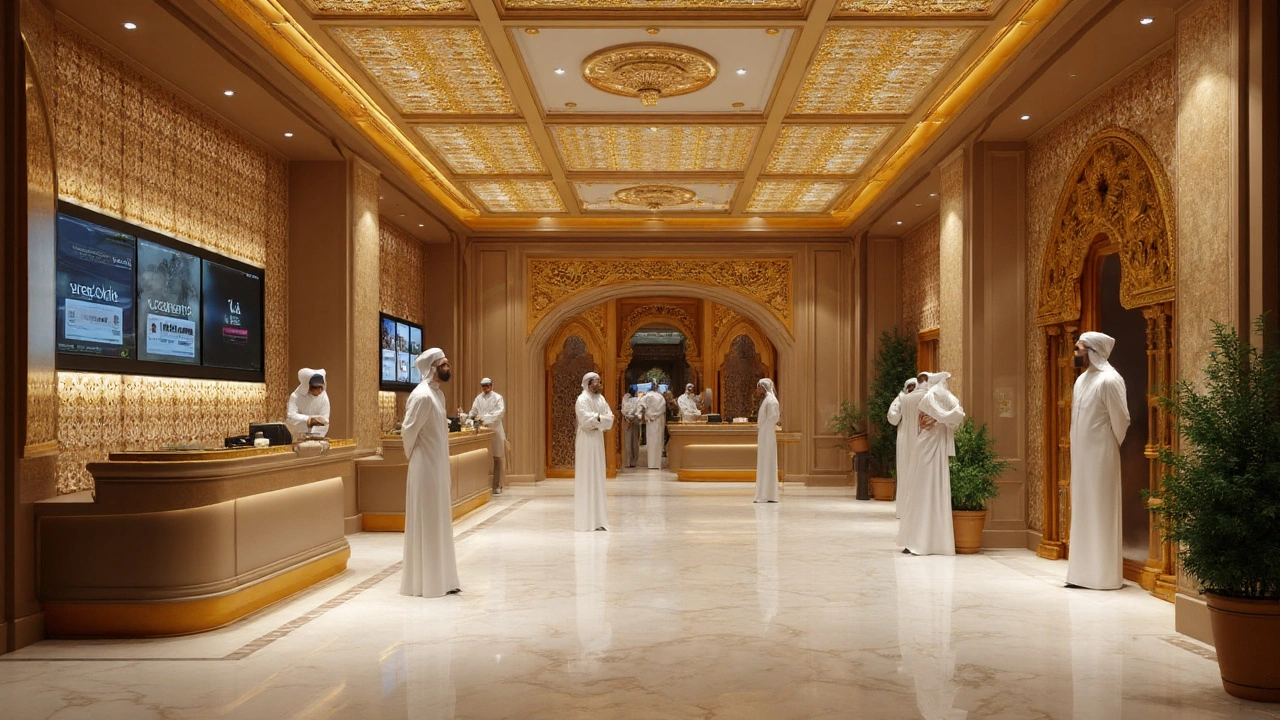Picture this: you’ve just scored your dream job or business deal in the Middle East, and the next big question hits you—what’s the best Arab bank to trust with your money? This isn’t just about picking a place to stash your cash. The financial world here is competitive and full of surprises. Some banks offer digital wallets that rival Western fintech, while others serve up super-cushy VIP lounges for a taste of the luxe life. But dig a little deeper, and you’ll see big differences in fees, service, and accessibility. So if you want your money handled right—whether you’re in Dubai, Riyadh, Cairo, or Beirut—the decision really matters. Ready for the inside scoop?
Understanding Arab Banks: What Makes Them Special?
Let’s break it down, no fluff. Arab banks aren’t just local versions of Western giants. They’re the financial backbone of an entire region, mixing tradition with serious 21st-century tech. You’ll find old-school brands like Arab Bank Group (headquartered in Amman since 1930, with over 600 branches in 30 countries) sitting side-by-side with new contenders hustling to bring their mobile apps and cardless ATMs. But what makes them unique isn’t only their history.
First off, Arab banks are often deeply rooted in family and cultural values. Many have built their reputation on personalized service, privacy, and trust—qualities that go a long way in this part of the world. Sharia-compliant banking is another gigantic factor. Banks like Al Rajhi Bank and Dubai Islamic Bank are built on Islamic financial principles, meaning no interest and transparent, ethical deals. That’s a big draw for millions of customers who want to keep their banking in line with their faith.
Another key piece: these banks cater to a global crowd. Whether you’re an expat oil engineer in Saudi, a luxury shopper in the UAE, or a small business owner in Morocco, there’s likely a bank with the right fit. You’ll see Arabic, English, and even French support in places like Lebanon or Tunisia. The customer service vibe can also feel way more personal. In fact, a 2024 survey by Statista named customer experience as the number one reason Middle Eastern clients switched banks, beating even fees and rates.
Of course, there’s a practical side too. The best Arab banks serve up slick digital tools: instant remittance apps, biometric logins, and debit cards that work worldwide. Want to avoid long lines? Some even let you open accounts online using just your passport and a selfie—no joke! And for investors, major Arab banks offer access to regional and global markets, with English-speaking brokers ready to help you invest from Cairo to London. The trick is knowing which bank matches your needs, your location, and your lifestyle.
The Heavyweights: Biggest and Best Arab Banks Face Off
Alright, let’s cut through the noise and talk big players. When folks say “best Arab bank,” they’re usually talking about a handful of powerhouses: Arab Bank Group, Al Rajhi Bank, National Commercial Bank (NCB, recently rebranded as Saudi National Bank), Emirates NBD, and Qatar National Bank (QNB). Each one has a strong reputation but they shine in different ways.
Arab Bank Group—This one’s got serious historical weight, operating for nearly a century. Its international network is the largest among Arab banks—600+ branches across five continents. Arab Bank is popular for solid online banking, business services, and international wire transfers. If you’re planning to move money or manage accounts across borders, it’s a safe bet. On the downside, some say it feels a bit old-school compared to glossier UAE banks.
Al Rajhi Bank—Based in Saudi Arabia, this bank is huge in both size and influence, with over 600 branches mostly in the Kingdom. It’s the world’s largest Islamic bank by assets as of 2025, and its digital services have taken off since 2022. What hits home here is reliability, strict Sharia compliance, and all-in-one family banking. Drawback? It’s less global—outside the GCC, services can feel limited.
Emirates NBD—Now we’re in Dubai territory. This bank is made for tech-savvy users. Think mobile-only accounts, real-time stock trading, virtual cards, and a slick international remittance platform (Liv.). Plus, if you enjoy lounge access at Dubai International Airport, this is your jam. It also ranks top for customer service across the UAE, according to the 2024 Brand Health Study by YouGov. The only hiccup: premium perks don’t come cheap.
QNB (Qatar National Bank)—Looking for international reach with Gulf prestige? QNB holds the title for the largest bank in the Middle East by assets (over $320 billion as of August 2025). They’re leaders in business banking, financing mega-projects, and serving high-net-worth clients. But be prepared for a more corporate vibe—think suit-and-tie rather than cozy neighborhood feel.
Are there dark horses? Sure—Dubai Islamic Bank, Bank Audi in Lebanon, and Mashreq Bank stand out for special niches. Dubai Islamic Bank leads for Sharia-compliant products and mobile innovation. Mashreq Bank, also in the UAE, is famous for its quick loan approval—sometimes in under 5 minutes. If you’re in Egypt, Commercial International Bank (CIB Egypt) is the go-to for businesses and digital users.
What about the numbers? Here’s a glance at the biggest names by total assets (stats updated as of June 2025):
| Bank Name | Country | Assets (USD Billion) | Key Strength |
|---|---|---|---|
| Qatar National Bank (QNB) | Qatar | 320+ | International presence, business banking |
| Emirates NBD | UAE | 230 | Tech innovation, customer service |
| Saudi National Bank (SNB) | Saudi Arabia | 240 | Corporate banking, retail scale |
| Al Rajhi Bank | Saudi Arabia | 186 | Islamic finance, family banking |
| Arab Bank Group | Jordan | 64 | Transnational reach, cross-border services |
That’s not the whole story, though. Size doesn’t always mean better for your situation. Maybe you want easy ATM access when you’re traveling, zero-fee international money transfers, or a banker who’ll call you by your first name and remember Zeus, your dog. It’s all about fit—and sometimes, smaller banks nail it with customer loyalty, multilingual support, or no-fuss digital experiences even the big names can’t match.

Types of Banking Services from Top Arab Banks
Banks here aren’t just about current accounts or loan officers in fancy suits. There’s a smorgasbord of services kicking around. Let’s break down the usual suspects and some hidden perks you might not know exist.
1. Personal Banking: Think everyday transactions, debit and credit cards, savings and checking accounts, personal loans, home mortgages, car finance, and of course, 24/7 mobile banking. Emirates NBD’s “Liv.” app, for example, lets you split bills, send payments with emojis, and track spending in both Arabic and English—all on your phone.
2. Business & SME Banking: Here’s where banks like CIB Egypt or Commercial Bank of Dubai shine. You’ll get working capital loans, trade finance, online payroll, and even business advice—sometimes from a dedicated relationship manager so you never feel lost in the shuffle.
3. Islamic Banking: Don’t want interest charges or hidden fees? Islamic banks like Al Rajhi, Dubai Islamic Bank, and Bank Audi offer products built on murabaha (cost-plus financing) instead of interest loans, so everything’s transparent and sharia-compliant. This isn’t just for locals—expats often use these banks for ethical savings or halal investment funds, too.
4. International Banking: If you plan to send money back home or manage assets overseas, banks like Arab Bank Group offer multi-currency accounts, global debit cards, and easy remittances. Their SWIFT wire transfer fees can be lower than you’d expect and often get your money there same-day—big if you’re supporting family or doing cross-border business.
5. VIP & Wealth Management: Got a healthy balance? You’ll be treated to lounge access, travel insurance, premium credit cards, and invites to exclusive events—pretty standard with QNB or Emirates NBD’s “Priority Banking.” Some even have personal wealth advisors, not bots. This level isn’t just for the ultra-rich; mid-tier accounts now come with perks like zero-fee withdrawals or luxury gifts. Imagine getting airport rides and birthday cakes from your bank—sounds wild, but it happens!
6. Digital-Only Services: Recent years have seen a surge in digital-first banks (think Mashreq Neo or Liv. by Emirates NBD). These platforms run entirely from your phone—no paperwork, no physical branches, but solid features like instant international transfers and digital investment tools. According to a 2025 McKinsey study, 47% of Middle Eastern bankers under 35 now prefer digital-only accounts for flexibility and speed.
Your main takeaway—Arab banks are way more than just someplace to write checks or pay your rent. Whether you value face-to-face service or the freedom to manage everything via app from a dog park, there’s a service for you. It’s not always obvious which bank delivers best, though, so let’s talk strategy.
How to Choose the Best Arab Bank for You (Tips, Tricks, Comparisons)
Let’s say you’re new to the region, or maybe you’ve been here a while but your current bank just isn’t cutting it. Where do you start?
- Know Your Priorities. List your must-haves: Is it no-fee ATM access? Lightning-fast mobile banking? English and Arabic support? Your checklist shapes everything else.
- Look Up Real Reviews. Skip shiny brochures—check forums, personal blogs, and difference-maker reviews on Google or Trustpilot. Anecdotes matter. Someone mentions how their branch manager once brought treats for their dog? That’s a bank that cares about service, not just numbers.
- Compare Fees. Annual account fees, ATM charges, transfer rates, minimum balance requirements—they’re all over the map. QNB and NCB usually offer low international transfer fees, while digital newcomers might slash ATM surcharges.
- Test Their App. Download a few banking apps. See which loads fastest, supports English (and maybe French), and lets you open accounts online. Don’t underestimate the power of a smooth selfie onboarding process.
- Ask About Branch and ATM Locations. If your job moves you from Dubai to Abu Dhabi to Manama, make sure your bank has a presence everywhere you go. Emirates NBD has the densest ATM coverage in the UAE. Arab Bank Group covers the entire Levant, so you never have to worry about finding your own bank’s machine.
- Check for Perks. Traveling a lot? Prioritize banks with strong airport partnerships—think free lounge access or fast-track services. These little things add up fast if you’re always on the go.
- Customer Service That Gets You. Long call center wait times or endless forms? That’s a no-go. Ask friends or network contacts—word of mouth often paints a better picture than official ratings.
- Sharia or Not? Even if you’re not particularly religious, Sharia-compliant banks sometimes offer greater transparency and no surprise interest rates. Worth considering if you like to know exactly what you’re paying for.
- Safety First. Look up each bank’s credit rating. Most big Arab banks are rated by Moody’s or Fitch, and all use strict security measures—think OTPs, SMS verifications, and biometric logins. No one wants a headache from identity theft.
To make it even simpler, here’s a quick comparison:
| Bank | Best For | Mobile App? | International Service | Sharia Options |
|---|---|---|---|---|
| Emirates NBD | Expats, digital banking | Yes | Strong | Yes (partial) |
| QNB | Business, international | Yes | Excellent | Yes |
| Al Rajhi Bank | Sharia, local clients | Yes | Good (GCC) | Yes (Full) |
| Arab Bank Group | Cross-border, reliability | Yes | Very strong | No (mainly conventional) |
One last pro tip: Visit a branch before you decide. First impressions can tell you a lot. Notice if the staff greets you, explains things in your language, and takes their time meeting your needs—these little details mean fewer headaches down the line.
If you’re all about digital, take five minutes and scroll through each bank’s social media. Active accounts hint at responsive support (and fun perks—like flash giveaways). Finally, remember, banks compete hard in the Arab world—so don’t be afraid to negotiate rates or ask for custom bundles. Sometimes loyalty gets you more than you expect.








Hannah Ronquillo
August 8, 2025 AT 19:41I've been researching Arab banks for a while now, especially since I have clients interested in expanding in the Middle East. This post is a great starting point! When we talk about services and fees, something crucial that often gets overlooked is the digital banking infrastructure. Many of these banks are rapidly upgrading their online platforms, which is a huge plus for international transactions.
Also, reputation here isn’t just about financial stability but compliance and customer service quality. For those looking for long-term partnerships, these are key factors.
I'd love to see a breakdown of which banks offer the best cross-border capabilities and support for international clients, since that ultimately affects usability.
Tim Paradis
August 11, 2025 AT 04:40The article really seems to go for breadth rather than depth. Honestly, the Middle East's banking scene isn’t as rosy as some might think. High fees? Absolutely. Customer service? Often underwhelming unless you’re a VIP client.
Honestly, picking a 'top' bank without criticizing these realities is misleading. We gotta be transparent about those hidden costs and stringent policies that plague the average user. But hey, the review covers quite a few banks at once, which is useful for some broad comparisons at least.
Matt Ferry
August 12, 2025 AT 22:20Honestly, I’m always skeptical about these top bank lists. Who decides what’s best? Usually, it's the companies pumping cash into these reviews. The whole Middle East banking system has its quirks, and lots of folks here just want quick, straightforward banking without the drama.
So, calling out a ‘top’ bank feels a bit artificial. I’d prefer a more nuanced take that accepts none are perfect.
At the same time, it's nice to get a general idea though. Just don’t take these rankings as gospel.
Richard Reyes
August 17, 2025 AT 05:06Good afternoon, colleagues. This comparative analysis of Arab banks is quite thoughtful and provides a systematic overview of various financial aspects. When evaluating these institutions, one must also consider the regulatory frameworks which differ significantly among Middle Eastern countries.
Such factors affect not only customer experience but also international collaborations.
I also appreciated the inclusion of fees and reputation metrics, which are fundamental for any analytical assessment.
Looking forward to further discourse on how these banks address digitalization trends. 😊
Leanne McNally
August 19, 2025 AT 12:40Oh great, another list claiming to crown a ‘top bank’ in the Middle East like it’s some sort of soccer tournament. Except banks don’t wear jerseys, and frankly, none of them are playing clean all the time.
Fees? Pfft, those things sneak up on you like a cat in the night when you least expect it. And the ‘reputation’ bit? What does that even mean when half of these banks are juggling political and economic instability behind the scenes? Classic case of shiny surface, rotting core.
But hey, gotta love a good list for the laughs it gives.
Kristin Kuchenbecker
August 21, 2025 AT 20:13I really appreciate this detailed comparison! To add, it’s important to remember that the banking choices in the Middle East are heavily influenced by religious and cultural norms, especially Islamic banking principles.
This can affect product offerings — which might actually be a huge advantage for some users seeking Sharia-compliant options.
Also, transparency in fees is a big deal. When banks clearly communicate their fee structures, it builds trust.
The Middle East banking scene is dynamic, and it’s exciting to see thoughtful guides like this encouraging smarter financial decisions!! Really looking forward to more in-depth follow-ups!
Tony Giny
August 24, 2025 AT 03:46This is a succinct overview, and what stands out is how regional differences affect banking norms across Arab countries. For example, a bank highly rated in the UAE may not hold the same prestige in Jordan or Egypt.
Moreover, customers should weigh accessibility and language support, especially if they are expats. Some banks provide excellent English services, others less so.
Ultimately, personal preferences for fees versus service quality should guide the choice, as the 'best' is subjective.
rohit patel
August 26, 2025 AT 11:20Honestly, the so called “best” Arab bank depends on what you want. Most banks in the middle east are slow with tech stuff. Money transfer delays happen often plus hidden charges are everywhere if you not careful.
Also, I have seen banks with big fancy reputations but terrible customer care. It’s mostly about connections and who you know.
So be careful trusting just rankings and reviews. Do your own checks and ask people you know in the region.
martha urquizu
September 1, 2025 AT 06:13While these comparisons are helpful to a degree, I must assert that we should be wary of underlying motivations behind such rankings. There's always a chance that banks influence these reviews either directly or indirectly.
Furthermore, I advocate a critical look at how banks engage in compliance with human rights and ethical lending practices, which are often overlooked in fee-focused assessments.
Consumers deserve transparency not only in fees and services but in corporate ethics.
It’s important to question what the data might be leaving out.
william de simone
September 7, 2025 AT 19:41This is an interesting overview, and I appreciate the effort to include fees and reputation metrics. For anyone considering banking options in the Middle East, I'd suggest they also consider political stability impacting banking operations. Some countries face more economic fluctuations, which can affect currency and services.
Additionally, the ease of account opening procedures varies widely.
I believe future reviews could benefit from user testimonials and updates on recent regulatory changes to give a fuller picture.